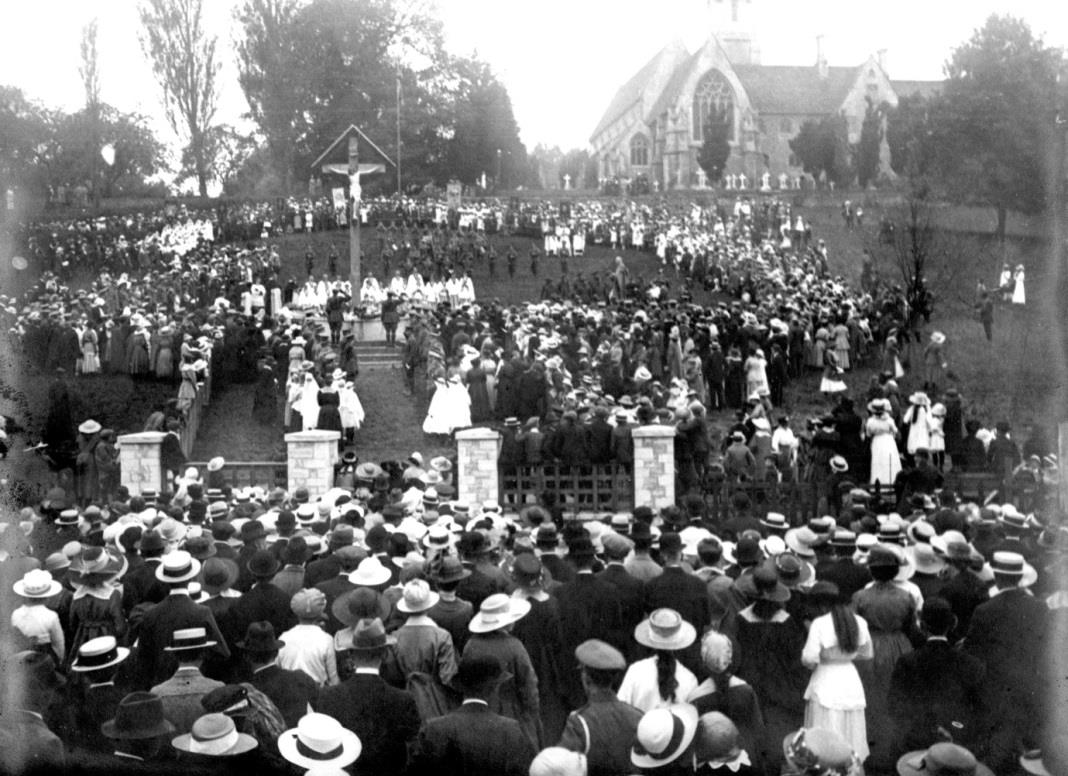The First Remembrance Sunday August 4th. 1918

If the vast crowds that turned out on June 3rd 1917 were unexpected, then that surprise was exceeded by the even greater number who came to the first ever Remembrance Sunday, held here on August 4th 1918, the fourth anniversary of the outbreak of the war, as well as being Trinity Sunday and St. Dominic’s Day.
“….it would be hard to recall any function like it …..it will be obvious to say that as far as the eye could reach, all along the Bath Road, up the hillside to the Common, and right up to the monastery church itself, stretched a crowd such as the neighbourhood has never seen. For even last year , when this Cross was consecrated by Bishop Burton , and a crowd that experienced people estimated as ten thousand had assembled , there was not such an assemblage as on Sunday”.
.
The Stroud News gave an estimate of 4-5000 at this service, but the army, who perhaps had more skill in the art of estimation of crowds, estimated ten thousand.
“The great ceremony took place at 6.30 p.m. when the procession filed down the field and grouped itself round the Cross. The military mustered two hundred strong, and the Catholic members of the Australian Aerodrome nearby formed a bodyguard to the Cardinal. The choir – admirably trained by Mr Paul Clark, one time Precentor at Truro Cathedralimpressed everyone. After the choir, the schoolchildren, the military, and the community – sadly reduced in numbers by the war- came his Lordship the Bishop of the diocese, then came the Cardinal’s Metropolitan Cross, and finally the Cardinal himself.”
.
The sermon was given by Cardinal Bourne who had arrived from London by train. The Stroud News had explained to those who asked what a Cardinal was. He spoke at length on the progress of the war, which by this time was almost won and gave thanks to God, those who had died; those who had lost their menfolk; and those who had prayed.
“Let not the thought of the gallant men who, in their thousands and hundreds of thousands, on the land and on the sea and in the air, have given up their lives in defence of King and Country and Empire, ever depart out of your hearts. For long years to come mothers will tell their younger children of the gallant boy who went forth from that same home to give his life in discharge of a sacred duty. Many a widow will set before her orphaned children the thought of the father, who, perhaps, they can scarcely remember, who, again, at the call of duty, gave up everything that this life holds dear in
order to defend his Country and his King. To those among you who understand and share the almost universal faith of Christendom, that grateful memory will be a prayer offered every day for the repose of the souls of those who have died in our sacred cause. Never in the past has that oft-uttered prayer, “Eternal rest give unto them, 0 Lord, may perpetual light shine upon them,” meant to our heart what it means to-day.”
